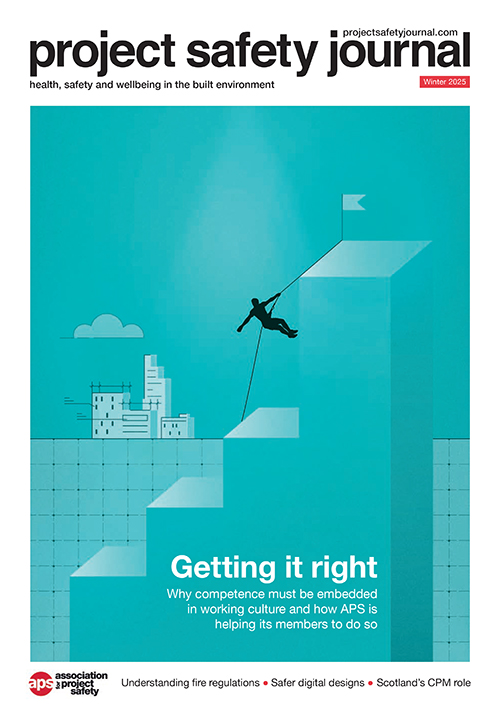
Public confidence in construction plunged following the Grenfell fire – but the industry will still have a self-regulatory role in product safety through the new Code for Construction Product Information. That’s worrying, says David Shepherd.
Recently, I’ve been reflecting on our industry’s response to the Grenfell tragedy and, especially, a key recommendation of the Hackitt Report.
Recommendation 7.1a of that report (p127) required that: “a clearer, more transparent and more effective specification and testing regime of construction products must be developed. This should include products as they are put together as part of a system”.
In response to this and other recommendations, the Independent Review of the Construction Product Testing Regime was published earlier this year. Under the heading, Marketing and Product Information, the report cited an example of missing product information which was particularly relevant to the Grenfell tragedy, that is: “omitting information relevant to product performance and selection”.
In November 2004, the cassette form of Arconic’s Reynobond PE product (which was fatefully used to clad Grenfell) underwent test ‘B5’ and performed so badly that the test had to be halted after just over 16 minutes. Yet, because Arconic never informed the British Board of Agrément (BBA), the manufacturer was able to retain the required product certification for Reynobond PE, despite this adverse result.
To remedy this lack of transparency, the Independent Review proposed the Assessment and Verification of Constancy of Performance (AVCP) system. However, AVCP assessments can range from self-certification to fully involving approved bodies, like the BBA.
Manufacturers can still self-certify
So, for products that are not deemed to be ‘safety critical’ (according to the criteria in Schedule 11 of the Building Safety Act) it remains entirely possible for manufacturers to withhold failed tests and to self-certify. This approach is unlikely to restore public confidence.
Notably, in response to the select committee recommendation that test failures and re-run tests should be published, the Independent Review suggested that “doing so would not make a useful contribution to the necessary principle of transparency”.
Instead, the review explained: “The purpose of a regulatory system is to set performance standards that are adjudged to be ‘good enough’, and to ensure compliance. Again, if the standard turns out not to deliver the performance which offers adequate protection, possibly with the addition of a margin of safety, then the standard should be reviewed.”
In response to that statement, the obvious rhetorical question is: how many more lives will be sacrificed due to standards that lack the rigour to “deliver the performance which offers adequate protection?”
Surely, an ounce of prevention – e.g. mandatory reporting of failed results – is worth a pound of cure – e.g, revising insufficiently rigorous standards.
And, given the Grenfell tragedy, why wouldn’t it be wise to implement a product testing regime that errs (for once) on the side of caution?
Concern about Code for Construction Product Information
It is startling that, despite the steep decline in public confidence that resulted from Grenfell, and which prompted the Hackitt Report to recommend “a clearer, more transparent and more effective specification and testing regime”, the Independent Review still insists that “there is a useful self-regulatory role that the industry can play in setting and enforcing standards before intervention by the Construction Products Regulator. This is recognised in the Code for Construction Product Information developed by the Construction Products Association (CPA).”
The code itself was first published in the 2019 Call for Evidence (CFE) research conducted by Marketing Integrity Group (MIG). This body was established by the CPA itself.
Critically, to gauge support for the Code, the CFE survey introduced a final question with a fallacious binary. It asked respondents to choose between two ways of ensuring “the accurate production and use of manufacturer product information” – either, an industry code, or legally binding regulation – as it would be impossible to do both.
Also, while more respondents supported an industry code, it is worrying that the same survey revealed that “only 25% of users and 50% of providers rated their understanding of product testing and certification processes as ‘very good’”.
Since the survey was published, even the Institution for Engineering and Technology has expressed concern about the Code. In response to the CFE consultation, it wrote: “A mandatory code of conduct is likely to prove confusing in the context of the emerging Construction Product Regulator and has the potential to distract from the mandatory requirements that government will shortly introduce.”
Woefully inadequate
When I think of this survey, I’m reminded of an episode from Yes, Prime Minister (the outstanding 1980s political comedy) when the principal private secretary, Bernard Woolley, informs Sir Humphrey Appleby (played by the late Nigel Hawthorne) of the prime minister’s latest radical pet policy: the reintroduction of National (Military) Service. A recent opinion poll also suggests that the new policy had won popular support.
Sir Humphrey persuades Woolley to conduct another poll asking two different sets of leading questions relating to National Service. By the end of the first set, Woolley is firmly in support of National Service. By the end of the second set, the bewildered civil servant finds himself rejecting the same policy.
In the context of British comedy, Appleby’s clever use of leading questions is hilarious. In the context of preventing another ‘Grenfell’, resorting to leading ‘either-or’ questions is woefully inadequate.
Surely, the 72 victims and many survivors of the Grenfell tragedy deserve much better than this.
David Shepherd is digital product manager for the Houses of Parliament Restoration & Renewal Delivery Authority. The opinions expressed are his own and do not reflect the views of his employer.











